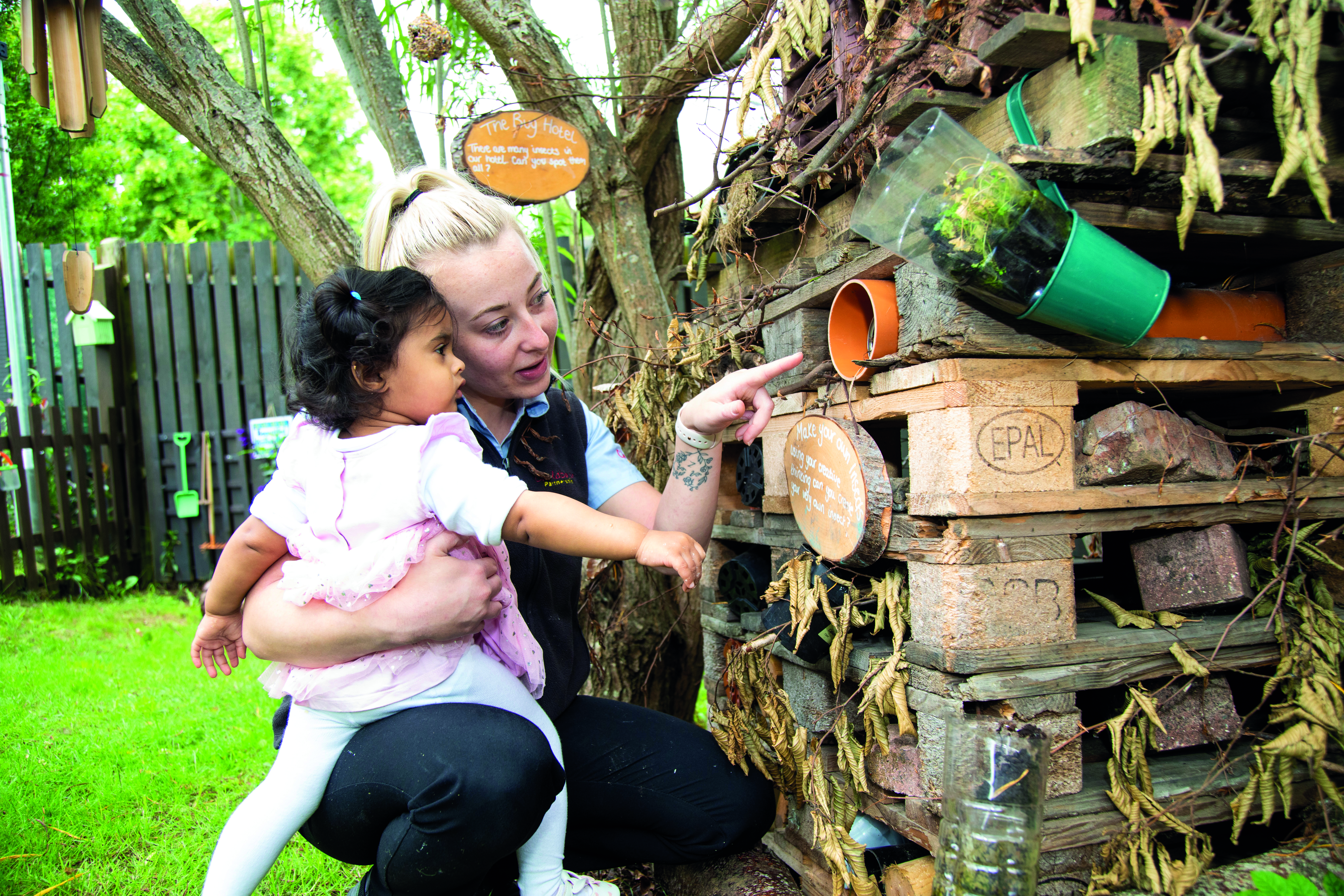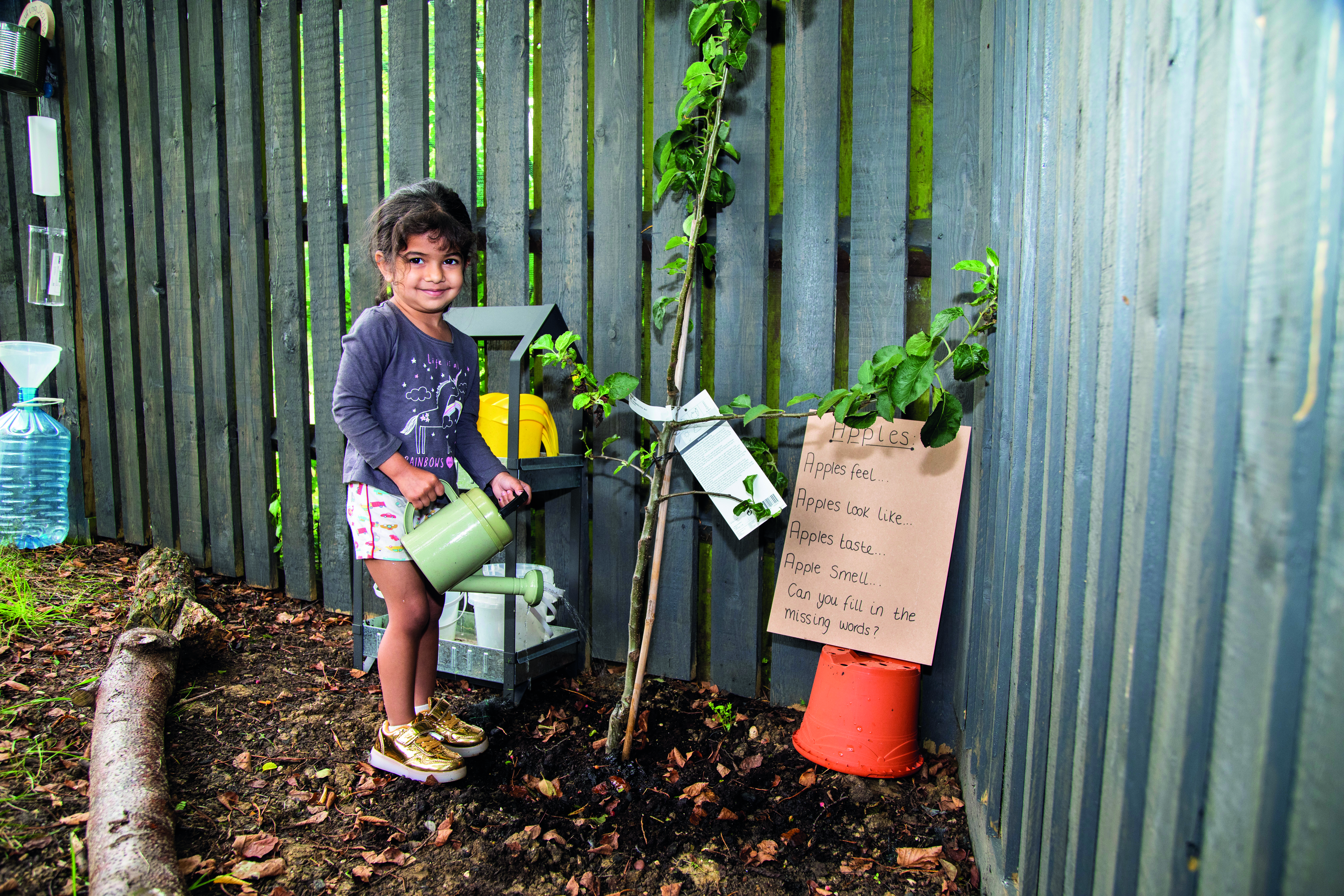
More than 190 world leaders will meet in Glasgow at the end of October to outline their plans for reducing emissions for the UN Climate Change Conference of the Parties (COP26). Experts believe that this year’s summit has a ‘particular urgency’.
With wildfires, floods and storms intensifying across the world, unpredictable weather causing damage to homes and livelihoods, and car-based pollution affecting the health of millions of children, we are no longer teaching children about catastrophes that occur far away.
But as businesses begin to recover from the pandemic, with an aim to build back better – and greener – this year has seen a renewed focus on fighting climate change, and more consumers are adopting ‘climate-friendly’ lifestyles. There is also evidence that parents are looking for sustainable childcare practice.
Emma Rooney, managing director of Childbase Partnership, an employee-owned chain of 44 nurseries, says, ‘Halting the destruction of our planet is the ultimate challenge of our time and one in which early years providers have a part to play given our commitment to secure the best possible future for the children in our care.’
ADVOCATING CHANGE
There are two distinct groups advocating the importance of sustainability in the early years:
- Nursery businesses conscious of the importance of reducing their carbon footprint.
- Early childhood education experts focused on the curriculum and children’s learning.
These two groups work together to lobby Government to bring sustainability to the forefront of early years education.
Cheryl Hadland, managing director of Tops Day Nurseries, is a passionate advocate for environmentally sustainable business practice and education. She has long been championing ‘green’ practices across her 30 settings in the South of England, starting with the 2017 glitter ban that brought global media attention and, more recently, extending its ‘real’ nappy scheme, with plans to use only washables by 2022.
She shares her knowledge and experience through the Green Early Years Choices Champions Organisation and the Early Childhood Education and Care Sustainability Forum, which she set up to share good practice with like-minded professionals in the sector. The forum includes representatives from nurseries that have committed to becoming environmentally sustainable – Tops Day Nurseries, Childbase Partnership, London Early Years Foundation, N Family Club, Enya’s Childcare and Young Friends Nursery – along with academics John Siraj-Blatchford, director of SchemaPlay, Diane Boyd from Liverpool John Moores University and Janet King from CACHE.
WHAT DOES BEING SUSTAINABLE MEAN?
Being sustainable is not just about being environmentally friendly, it is social and economic as well as ecological. So, along with teaching children about protecting our planet and not taking our natural resources for granted, it touches on areas such as human inequality, social injustice and poverty, all of which are set out in UNESCO’s 17 Sustainable Development Goals (SDGs).
Increasing numbers of early years providers are committed to reducing the damaging impact they have on the environment and making decisions that are in the interests of protecting the natural world. Hadland says there is ‘no doubt’ that some nursery owners are taking climate change more seriously and are weaving aspects of sustainability into their business practices and curriculum. ‘Local authorities are also getting on board and both Somerset and Bromley have invited me to speak at their early years conferences,’ she adds.

PARENT POWER
Extending the support for sustainability into early childhood education has been one of the missions of the Early Childhood Education and Care Sustainability Forum. Siraj-Blatchford says, ‘Sustainability does not feature in any of the statutory early years documents. The Government has committed to integrating sustainability development throughout the education system, with its signature on the UN’s SDGs, but another chance has passed, with the latest revision of the EYFS, to get this as high on the agenda as it deserves.’
Despite acknowledging the limiting effects its omission might have, he says sustainability is included in the Birth To 5 Matters guidance and parent power may drive forward the sustainability agenda to our youngest children.
‘Settings are adopting sustainability as a key area because it’s so popular with parents. The OMEP UK Early Childhood Sustainable Citizenship Award, which launched in 2019, has seen a level of parental partnership that has often not been attainable with other schemes, such as reading. Although some of the award activities do support literacy and numeracy with the sustainability spin, this is very significant for early childhood education, generally.’
Childbase’s Rooney says parent engagement in its eco-programmes, and endorsement of these in confidential surveys, show they want to see providers doing ‘the right thing, honestly and transparently’. She adds, ‘Factors influencing customers are constantly shifting, but in recent years are most definitely being shaped by the climate emergency. We expect in the next three to five years, this area of focus will be absolutely business-critical.’
Enya Mooney, owner of Enya’s Childcare, a Green Flag-certified Eco School in Peterborough, says since the start of the pandemic, new parents have been interested in its work with children on becoming climate change enthusiasts.
‘We’re not afraid to get out into the community with the children and make a bit of commotion, marching down the Friday market with banners and boom speakers in tow. We’ve raised awareness of endangered species like bees, chanting “Save the Bees” or “Save our Planet”, and for days like Plastic Free July. The children love it and it’s great for their confidence and communication skills.’
JOURNEY TO SUSTAINABILITY
Many sustainable business practices will save money down the line. For example, through less food waste and less spend on resources. It might seem daunting at first, but the best advice for settings wanting to become more environmentally sustainable is to ‘start small’.
Top tips from some settings that are on their way to becoming environmentally sustainable include:
- Start with something where you have direct control. For example, monitoring food waste and adjusting menus to better reflect differing tastes, preferences and portion sizes. This is not only good for the planet but also results in savings in purchasing and waste removal.
- Commit to changing light bulbs from fluorescent to LEDs. This will involve the capital to change the light fittings and purchase the bulbs, but expect to break even in a year or less.
- Reduce plastic and introduce natural resources and non-toxic cleaning products.
- Turn lights off when not in use and turn heating down or off on warmer days. Swap to a reliable provider of ‘green’ electricity from renewable sources.
- Look at your utility bill – a smart meter for gas, water and electricity is usually free from energy providers.
- Educate and engage children in climate-positive action through schemes like the International Eco-schools Programme.
- Invest in auto-off taps, reduced-flush cisterns and aerating taps, which reduce water usage without sacrificing quality.
- Use a specialist collection and recycling service for disposable nappy waste to divert waste from landfill. Better still, use washable nappies.
- Invest in solar panels, which should result in cheaper bills. You may even receive a sum of money in return for the electricity that is exported to the grid.
Award schemes and resources
- Eco Schools: https://eco-schools.org.uk To attain Green Flag accreditation, nurseries engage in a seven-step programme led by an eco-committee of children and staff. Vetting of the projects is then carried out by an independent inspector.
- OMEP UK Early Childhood Sustainable Citizenship Award: https://bit.ly/3hP1BY3 A child-centred approach to learning about sustainability through activities that range from identifying birds and wildlife habitats to recycling and learning to be ‘economic’. Children also receive discounted access to venues such as conservation parks.
- Level 4 Qualification in Sustainability in the Early Years, developed by London Early Years Foundation in partnership with Cache: https://leyf.org.uk/green-leyf
- Education for Sustainability series by Dr Diane Boyd: www.nurseryworld.co.uk Explores meaningful and practical ways to introduce Sustainable Development Goals.
- All about… Early Childhood Education for Sustainability by Dr Diane Boyd: www.nurseryworld.co.uk
- SDGs for The Early Years by Montessori Europe in partnership with the Flourish Project: https://bit.ly/3hSM1uR
- Educating Social Responsibility published by the Early Years Alliance: https://bit.ly/2VYzi1L
- 50 Fantastic Ideas for Sustainability by June O’Sullivan and Nick Corlett
- Creating an Eco-friendly Early Years Setting: A practical guide by Cheryl Hadland
CASE STUDY: Childbase Partnership
 Childbase was verified as a ‘Climate Positive’ organisation earlier this year, after saving more greenhouse gas emissions than it generates. The nurseries – all of which have been awarded the Eco-Schools Green Flag accreditation for their commitment to exceptional environmental awareness and conservation – are pushing ahead with plans to achieve ‘net zero’ emissions by 2030 and have invested in a United Nations-certified CO2-reduction project aimed at supporting colleagues and customers to make more sustainable travel choices.
Childbase was verified as a ‘Climate Positive’ organisation earlier this year, after saving more greenhouse gas emissions than it generates. The nurseries – all of which have been awarded the Eco-Schools Green Flag accreditation for their commitment to exceptional environmental awareness and conservation – are pushing ahead with plans to achieve ‘net zero’ emissions by 2030 and have invested in a United Nations-certified CO2-reduction project aimed at supporting colleagues and customers to make more sustainable travel choices.
Managing director Emma Rooney says, ‘We made a commitment to sustainable development by firstly recognising our responsibility as a business to protect the environment and then actively working to achieve best practice.’
With over a decade-long focus on sustainability, Childbase’s approach now encompasses its pedagogy, purchasing and power requirements alongside staples such as ensuring all waste is diverted from landfill. But the journey has not been without challenges.
‘Establishing an accurate carbon footprint took a year of in-depth measuring and analysis on energy use, efficiency measures and emissions in all our settings which, at the time, was 43 day nurseries from Nottingham to Reading and head office,’ explains Rooney.
‘To ensure our efforts were not viewed as mere “window dressing” or “green washing”, and would affect meaningful change, we had to find a way to communicate complex concepts and information clearly and consistently to all stakeholders to engage them in the process.
‘Our plans to achieve net zero emissions by 2030 – which uniquely includes “Scope 3” emissions generated by those accessing our settings – is reliant on colleagues, customers and suppliers engaging in the process.
‘In 2020, in the midst of climate-related extreme weather events which broke all records, we decided to accelerate our plans by going “Climate Positive” – where we offset not only what we have emitted but created a credit to account for unknowns, with investment in “carbon reducing” projects in India. A challenging concept to communicate and an investment we needed to ensure met the highest available standards, hence our choice of United Nations Certified Emission Reduction (UN CER) scheme.’
On top of wider business changes, the ethos of sustainability is part of each nursery’s pedagogy. Emma Wallbridge, manager at Julia Durbin Day Nursery in Oxford, which is an Eco-Schools double Green Flag holder, says, ‘There is a real pride among parents and the staff team about how our children are embracing their responsibilities to the environment. I never get tired of parent stories of young children telling them off for putting recyclable waste in the wrong bin or for not turning off their lights.’
As for future aspirations, Childbase is completing its LED light replacement programme and will be converting its fleet to electric vehicles, migrating away from gas-fired appliances for heating, hot water or catering, and working with all stakeholders for them to be as sustainably minded in their travel decisions as possible.









